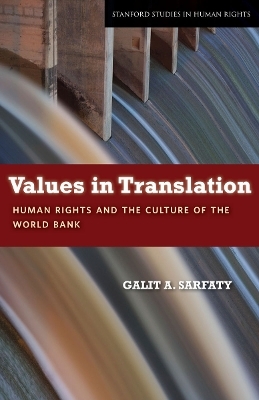
Values in Translation
Human Rights and the Culture of the World Bank
Seiten
2012
Stanford University Press (Verlag)
978-0-8047-6351-6 (ISBN)
Stanford University Press (Verlag)
978-0-8047-6351-6 (ISBN)
This book explores the organizational culture of the largest international development organization-the World Bank-and addresses the question of why the Bank has not adopted a human rights policy or agenda.
The World Bank is the largest lender to developing countries, making loans worth over $20 billion per year to finance development projects around the globe. To guide its investments, the Bank has adopted a number of social and environmental policies, yet it has never instituted any overarching policy on human rights. Despite the potential human rights impact of Bank projects—the forced displacement of indigenous peoples resulting from a Bank-financed dam project, for example—the issue of human rights remains marginal in the Bank's operational practices.
Values in Translation analyzes the organizational culture of the World Bank and addresses the question of why it has not adopted a human rights framework. Academics and social advocates have typically focused on legal restrictions in the Bank's Articles of Agreement. This work's anthropological analysis sheds light on internal obstacles including the employee incentive system and a clash of expertise between lawyers and economists over how to define human rights and justify their relevance to the Bank's mission.
The World Bank is the largest lender to developing countries, making loans worth over $20 billion per year to finance development projects around the globe. To guide its investments, the Bank has adopted a number of social and environmental policies, yet it has never instituted any overarching policy on human rights. Despite the potential human rights impact of Bank projects—the forced displacement of indigenous peoples resulting from a Bank-financed dam project, for example—the issue of human rights remains marginal in the Bank's operational practices.
Values in Translation analyzes the organizational culture of the World Bank and addresses the question of why it has not adopted a human rights framework. Academics and social advocates have typically focused on legal restrictions in the Bank's Articles of Agreement. This work's anthropological analysis sheds light on internal obstacles including the employee incentive system and a clash of expertise between lawyers and economists over how to define human rights and justify their relevance to the Bank's mission.
Galit A. Sarfaty is Assistant Professor of Legal Studies and Business Ethics at The Wharton School, University of Pennsylvania.
| Erscheint lt. Verlag | 20.6.2012 |
|---|---|
| Reihe/Serie | Stanford Studies in Human Rights |
| Zusatzinfo | 2 tables |
| Verlagsort | Palo Alto |
| Sprache | englisch |
| Maße | 140 x 216 mm |
| Gewicht | 431 g |
| Themenwelt | Recht / Steuern ► Allgemeines / Lexika |
| Recht / Steuern ► EU / Internationales Recht | |
| Sozialwissenschaften ► Politik / Verwaltung | |
| Wirtschaft ► Betriebswirtschaft / Management ► Finanzierung | |
| Betriebswirtschaft / Management ► Spezielle Betriebswirtschaftslehre ► Bankbetriebslehre | |
| ISBN-10 | 0-8047-6351-8 / 0804763518 |
| ISBN-13 | 978-0-8047-6351-6 / 9780804763516 |
| Zustand | Neuware |
| Haben Sie eine Frage zum Produkt? |
Mehr entdecken
aus dem Bereich
aus dem Bereich
warum unser Geld stirbt und wie Sie davon profitieren
Buch | Hardcover (2024)
FinanzBuch (Verlag)
30,00 €
denken und handeln wie ein professioneller Trader
Buch | Softcover (2023)
Vahlen, Franz (Verlag)
36,90 €


